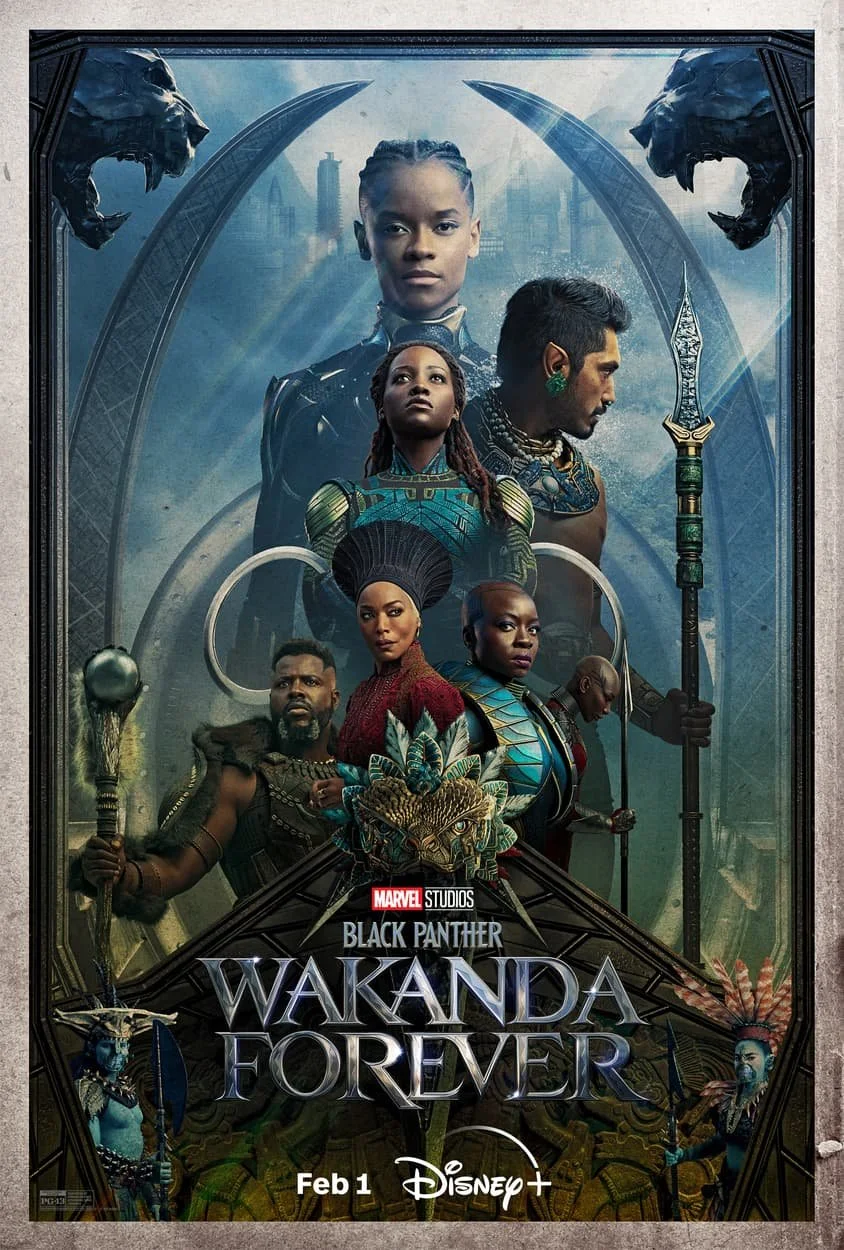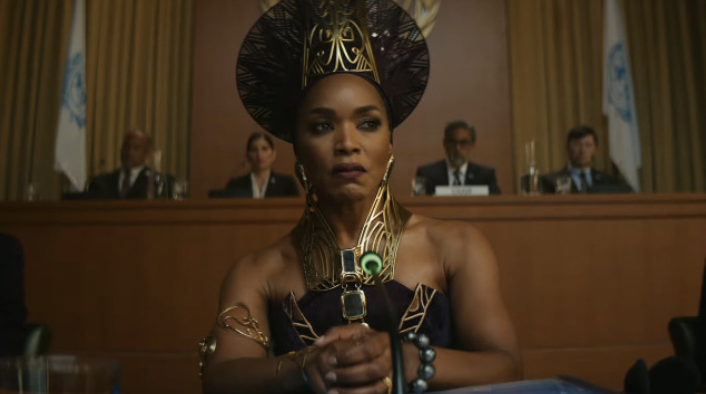Black Panther: Wakanda Forever’s Echoing Power
Photo from Marvel
Bella Gruber
Note: this review contains spoilers
Black Panther: Wakanda Forever is Marvel Studios’ newest movie in their collection of films. A sequel to the 2018 film Black Panther, Wakanda Forever’s visuals, representation, and powerful yet touching plotline, undoubtedly places it as one of the best movies of 2022.
Following the death of Chadwick Boseman (who played King T’Challa in the Marvel universe) in 2020, the movie picks up at the moment of T’Challa’s death. The weight of his death lingers through the entire movie without slowing the action, which was definitely a necessary component to suitably mourn him. A new issue is presented for Wakanda, as newly crowned Queen Ramonda and Princess Shuri find themselves in conflict with the Talokan tribe, underwater merpeople who have weapons just as powerful as the Wakandans.
Similar to the first Black Panther, the plot of Wakanda Forever showcases the theme of every Marvel movie–that good always prevails over evil. Yet, despite its engaging plot twists and action-packed war scenes, an underlying theme that isn’t as superficial is that we all function while grieving in different ways. The spirit of T’Challa, the Black Panther, is present throughout the movie despite his death, for Shuri, T’Challa’s younger sister, shifts her role from being the comedic little sister to becoming a leader in T’Challa and Queen Ramonda’s place. Viewers note that the actions that Shuri takes to protect Wakanda as she becomes the hero of the movie are influenced by T’Challa’s legacy, from being reluctant to go to war with the Talokan tribe to her decision to become the Black Panther.
Representation of Cultures
Wakanda Forever’s setting takes place in Africa, estimated to be around southeastern Niger. It’s not common that the public sees Hollywood movies with A-list actors taking place in an African country for more than just a scene or in contrast to western society, but the fact that Wakanda is portrayed as being more technologically advanced than any country in modern times is groundbreaking. The power that Ramonda, a female monarch of an African province, displayed over countries that have historically colonized and held supremacy over, is not often seen in Hollywood productions.
Photo courtesy of Yahoo
The beauty of Wakanda Forever is accentuated through the many cultures illustrated in the movie. Wakandan fashion is a crucial factor that incorporates real-life tribal characteristics. This is seen in the weapons and battle gear that Dora Milaje wears, the ring-like necklaces and bead-wear female characters are often seen wearing, and the disc-shaped headpieces worn by Queen Ramonda. The various patterns and styles of real-world African tribes presented in Wakanda Forever remind the audience of where Wakanda realistically lies on our globe, despite their futuristic lifestyle.
The Talokan people are described as originating in the Yucatàn region of Mexico. While the Marvel Cinematic Universe (MCU) has expanded to entirely different planets, galaxies, and multiverses, they haven’t yet had any tribes planted in the Caribbean. Just as Wakanda, the Talokan’s empire isn’t represented as an underdeveloped community in the desert of Mexico; instead, it’s given a backstory of becoming civilized in an underwater world within the Atlantic Ocean.
Riri Williams, a college student and engineering mastermind, is played by Domonique Thorne. Williams is an inspiration to young Black girls looking to go into STEM one day or become leaders. Williams’ outgoing personality, hardworking drive, and pride in herself make her a character that young girls are able to look up to.
The cast of this movie also carries its power in representing people of color and Africans within the MCU. The diversity of the cast is wide across the entire globe. To name a few, star Letitia Wright is Guyanese/British, Danai Gurira is American-Zimbabwean, villain Tenoch Huerta is Mexican, and Lupita Nyong’o is Kenyan & Mexican. The representation across the cast from being ethnically from Africa to South America sets Wakanda Forever aside from other Marvel and superhero movies that reach the public’s eye.
Visuals & Music
As in the first Black Panther, Wakanda Forever has drawn in a number of viewers through the incredible special effects and landscapes that compose both Wakanda and Talokan. Similar to Atlantis city, Talokan is a beautiful, underwater empire that pushes the boundaries of today’s CGI capabilities. Most Marvel fans who had seen Wakanda appear in previous Marvel movies weren’t surprised to see the futuristic architecture and technology components. In whole, the cutting-edge visuals make the audience’s viewing experience more pleasurable and immersive with the plot.
Photo courtesy of Yahoo
Both Black Panther and Wakanda Forever are recognized for their soundtracks. Rihanna, along with a plethora of electric hip-hop artists from across Africa and America are featured on the soundtrack. Ludwig Göransson composed the score, keeping traditional African beats, but also adding a modern electric element to the music that complements Wakanda’s modern society.
Photo courtesy of Spotify
Critique & Closing Statements
One critique of this film is that the building conflict in the middle of the movie is too drawn out. Reaching almost three hours, the majority of the action is at the beginning and end - where the state of Wakanda & the main characters are introduced and the war between the Talokans and Wakandans climaxes. While the time between the beginning and ending events that have the most action is necessary to understand the struggles that Wakanda encounters without King T’Challa, there’s a certain dullness, or lack of action, that lasts for too long before the plot climaxes. However, to a true Marvel fan, the length is no burden that holds them back from enjoying and deriving a moral theme out of this movie. Thus, the elements of Wakanda Forever –from the cultures represented to the realistic special effects–make up the touching story of how Wakanda strives without their beloved King T’Challa, and how their newest heir takes on the duties of the throne.









